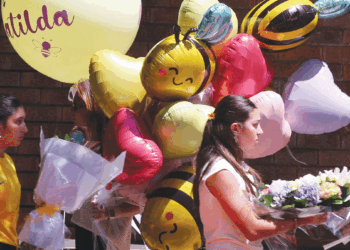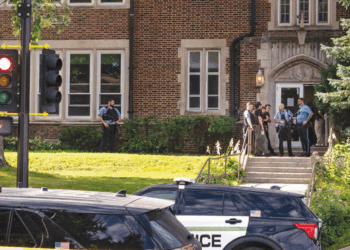In Jewish homes around the world on the evening of March 29, the 14th of Nisan, families will sit around the seder table and recount the story of the liberation of our people from cruel bondage in Egypt. We are commanded to refrain from eating leavened bread during the eight-day holiday; also, we are commanded to tell the Passover story to our children: “And you shall explain to your [child] on that day, ‘It is because of what the Lord did for me when I went free from Egypt.’”
As the Haggada instructs us: “If the Holy One of Blessing had not brought our ancestors out of Egypt, then we and our descendants would still be enslaved in Egypt. Even if we were all wise, or all full of understanding, or we were all elders who had told the story numerous times, or all Torah scholars, it is still our duty to tell the story. The more we expand upon the story, the more we are to be praised.”
So, Passover provides a time for all of us — no one is to be excluded from participating in the seder — to reflect on our liberation from slavery, and the birth of the Jewish people. And Passover’s liberation story has a universal quality that has been embraced by people suffering repression in various lands over the ages.
The Haggada for Jewish Community Action’s Immigrant Rights Freedom Seder last year, which was hosted by Mount Zion Temple in St. Paul, explained that Passover “stresses the three central themes of the Passover story: to welcome the stranger, to treat the worker with dignity, and to act as if we ourselves were once freed from slavery. Our story joins the stories of all people who have ever been in bondage, and our story compels us to work toward freedom for those who remain physically, spiritually or economically enslaved.”
In the same vein, the story in Exodus was embraced by African-American slaves in the South. The exodus of the Jews from Egypt became a parable for their freedom struggle. The analogy between the Jewish enslavement in Mitzraim (Egypt) and black slavery in the Old South is expressed in the spiritual “Go Down, Moses”: “Go down, Moses, Way down in Egypt’s land. Tell ol’ Pharoah, Let my people go.”
A modern retelling (haggada means “telling”) of our liberation story also can be found in The Freedom Seder: A New Haggadah for Passover, by Rabbi Arthur I. Waskow. This new version of the Haggada was published by Ramparts magazine in February 1969. Waskow, who is the director of The Shalom Center in Philadelphia, writes that his creation “seems to have been the first Haggadah, certainly the first widely circulated, that celebrated the liberation of other peoples as well as the liberation of the Jewish people.”
Waskow based his work on the “Saul Raskin Haggadah” that he received on the occasion of his Bar Mitzva, in 1946. This accounts for the “archaic English of the traditional passages,” which are enriched by the writings of Dr. Martin Luther King, Thoreau, Gandhi, Emanuel Ringelblum of the Warsaw Ghetto, Nat Turner and other social revolutionaries. In a 2005 note on the Web site of The Shalom Center, Waskow recounts that his Haggada was actually used in a Freedom Seder, on April 4, 1969, the first anniversary of the death of Martin Luther King. It was held in the basement of a black church in Washington, D.C.; about 800 people took part, half of them Jews, the rest black and white Christians.
Waskow’s radical Haggada can be found on his Web site at: theshalomcenter.org/files/freedomseder.pdf. It is an interesting document, encompassing both traditional elements and evoking the turbulent era of the late ’60s, when America was bitterly divided over issues of war and racial injustice.
In Waskow’s version of the Ten Plagues, for example, he writes: “The tradition says that we spill wine from our cups in recounting the plagues because it is incumbent on us to reduce our pleasure as we remember the sufferings of the Egyptians. And the tradition also tells us that when the angels rejoiced in the drowning of the Egyptians, the Lord our God, blessed be he, rebuked them saying, ‘Are these not my people also, and the work of my hands?’ Let us therefore grieve for the sufferings of our brothers the Egyptians.
“But let us also remember the lesson of the plagues: the winning of freedom has not always been bloodless in the past. Through the generations, our prophets, our rabbis, and our shoftim [judges], men like Micah who spoke the word of God directly to the kings and the people, men like Hillel who worked out the law of justice in daily life, and revolutionary leaders or ‘judges’ like Gideon have faced the issue of violence in the struggle for freedom.”
Waskow mentions the insurrection led by the abolitionist Nat Turner, then recounts the struggle of Jews in the Warsaw Ghetto. (The evening of the first seder coincides with the anniversary of the Warsaw Ghetto Uprising). The Haggada author quotes Ringelblum, in 1942: “Most of the populace is set on resistance. It seems to me that people will no longer go to the slaughter like lambs. They want the enemy to pay dearly for their lives. They’ll fling themselves at them with knives, staves… They’ll permit no more blockades. They’ll not allow themselves to be seized in the street, for they know that work camp means death these days. And they want to die at home, not in a strange place.”
In his recounting of the Ten Plagues, Waskow also tells a more recent story of civil rights workers imprisoned in a county jail in Magnolia, Miss. Of local interest, he mentions Chuck McDew — “black by birth, a Jew by choice, and a revolutionary by necessity” — a former leader of the Student Nonviolent Coordinating Committee (SNCC) in the early 1960s who now lives in West St. Paul.
However you tell the Passover story, it should not be difficult to instigate a lively discussion from the varied, rich strands of Jewish history and culture. Some pundits lately seem baffled that “Jews are liberals”; however, drawing on the ancient story of Jewish liberation from oppression, and the strong message of justice articulated by the prophets, it’s really not such a mystery.
All of us at the American Jewish World wish our loyal readers a happy Passover.
— Mordecai Specktor /Â editor@ajwnews.com
(American Jewish World, 3.19.10)


















